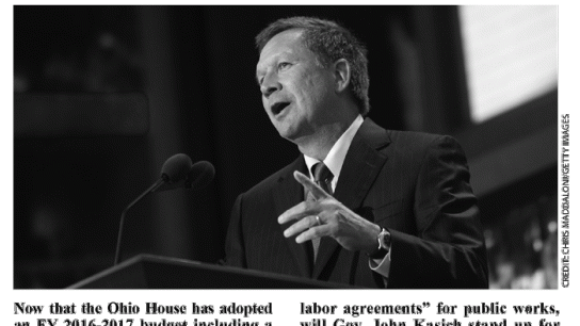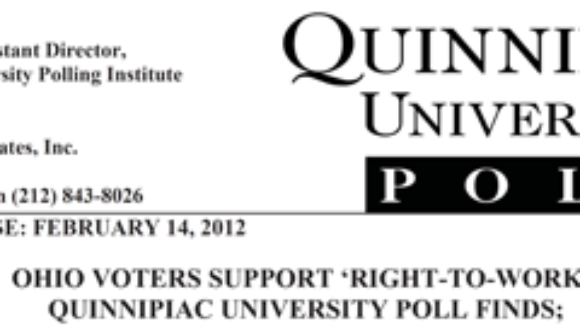Victory For West Virginia Hardhats, Taxpayers
Citizens Push Back Against Abusive ‘PLAs’ in State After State (Source: May 2015 National Right to Work Newsletter) Back in February 2009, one of the first actions President Barack Obama took…

Citizens Push Back Against Abusive ‘PLAs’ in State After State (Source: May 2015 National Right to Work Newsletter) Back in February 2009, one of the first actions President Barack Obama took…

Perhaps, Governor John Kasich should give all Ohio employees the right to join or not a join a union without being forced to pay tributes to union bosses. It looks like it is time to make Ohio a…

Writing for RedState.com, Jason Hart looks at the continued hardship union bosses are imposing on the state thanks, in part, to their victorious efforts to overturn needed reforms including Right to Work protections. In Wisconsin, Governor Walker’s public union reforms are pummeling the Big Labor narrative by saving taxpayer dollars and teachers’ jobs. Meanwhile, the professional class-warriors who get rich pushing “solidarity” force districts into layoffs by refusing to revisit unaffordable contracts. After similar reforms failed in Ohio thanks to a smear campaign exceeding $30 million, Ohio’s public workers are enjoying the sort of union victory that’s often accompanied by a pink slip. A month ago I shared stories from around the state of firings caused by the same union bosses who screeched against Governor Kasich’s “attack on workers.” To the surprise of neither of my website’s readers, this avoidable trend continues. Voters who opposed reform have caused the very problems Big Labor insisted reform would create: Marion Police say they are committed to answering the city’s 9-1-1 calls but come the [sic] January 1st, callers could see delays in response times. That’s because the [sic] 15 officers are being cut from the department. In Lorain, millions in cuts plus millions borrowed from the state aren’t enough:The cuts would be in addition to laying off 18 teachers and nine teachers’ aides, which was approved Wednesday night by board members and would save $1.5 million. The layoffs take effect Jan. 23. In Wapakoneta, home of Neil Armstrong, the teachers’ union is preparing to strike over a pay freeze and increased benefit costs, although administrators and non-union staff have already taken a pay freeze. The district, like many, has faced difficult financial times. It had $1.2 million of deficit spending last fiscal year and is projected to spend $1.6 million more than its annual revenue this year.

Big Labor Blitzes For Compulsory Unionism in Wisconsin and Ohio (Source: May 2011 NRTWC Newsletter) Since the 1960's, Big Labor lobbyists in 21 states have successfully pressured elected officials to pass statutes explicitly authorizing union bosses to get independent-minded public servants fired for refusal to pay dues or fees to a union the employees would never voluntarily join. Until this year, despite the growing success of the Right to Work movement with regard to the private sector, not a single state legislature had ever revoked government union bosses' forced-dues privileges after previously granting them by statute. But this March two states, Wisconsin and Ohio, made history by restoring the Right to Work of public servants. Over ferocious and sometimes menacing Big Labor opposition, Badger State legislators approved, and GOP Gov. Scott Walker signed into law, S.B.11. Key provisions in this law abolish all forced union dues and fees for teachers and many other public employees. Unfortunately, it leaves public-safety officers unprotected. The Buckeye State reform, which union militants opposed with nearly equal bitterness but considerably less media attention, includes provisions protecting the Right to Work of all categories of state and local government employees, including public-safety officers. This law, signed by GOP Gov. John Kasich, is still commonly referred to by its legislative bill number, S.B.5. National Right to Work Helped Mobilize Public Support For Reforms

Matt Mayer of the Buckeye Institute debunks the long-term economic growth without Right To Work freedom is sustainable. Mayer uses a Columbus Dispatch reporter Joe Hatlett column that featured Former Michigan Gov. Jennifer Granholm to expose the fact that corporate welfare and reduced regulations ignore the “proverbial elephant in the room weighing down” compulsory union states like Indiana, Ohio, Illinois,, and Michigan. From Matt Mayer’s post: “With Michigan bleeding jobs and tax revenues, Granholm said she followed the corporate playbook in her attempt to close a huge state budget deficit and make Michigan more competitive. ‘In listening to the business community, I cut takes [sic] 99 times, and I ended shrinking government more than any state in the nation. In my two terms, I cut more by far than any state in the nation. And yet, we still have the highest unemployment rate. There was no correlation.’ Granholm conceded that streamlining business regulations and lowering taxes — Kasich’s economic recovery mantra — are helpful, but they aren’t a panacea…[l]abor costs, help with start-up costs and proximity to markets are other factors.” Hallett and Governor Granholm fail to mention why streamlining regulations and lowering taxes aren’t helping the northern states (located within 50 percent of the U.S. population and with low start-up costs) compete against the southern and western states. Instead, Hallett ignores the obvious answer and pleads for an end to corporate pork (with which we enthusiastically agree). The reason Michigan and Ohio can’t compete is that the southern and western states already have fewer regulations and lower taxes, so “catching up” with those states still leaves the proverbial elephant in the room weighing down the northern states. Plus, those states are also pushing for lower taxes and fewer regulations, so the northern states are perpetually behind them. The elephant, which Governor Granholm does hint at, is labor costs, or, more specifically, unionized labor costs (see: General Motors and the United Auto Workers). As I noted in Six Principles for Fixing Ohio, “Of course, tax and regulatory burdens also impact a state’s economy. Although many of the forced unionization states have heavy tax burdens and many of the worker freedom states have light tax burdens, some heavily taxed worker freedom states (Idaho, Nevada, and Utah) had the strongest sustained job growth from 1990 to today. Similarly, a few moderately taxed forced unionization states still had weak job growth (Indiana, Illinois, and Missouri). The combination of both a heavy tax burden and forced unionization is deadly when it comes to job growth, as 11 of the 15 worst performing states are ranked in the top 20 for high tax burdens.” If Ohio and the other states from Missouri to Maine want to truly compete with Texas, Georgia, and South Carolina, then those states need to enact laws that protect the rights of workers not to join a labor union to get a job.

Matt Mayer of the Buckeye Institute debunks the long-term economic growth without Right To Work freedom is sustainable. Mayer uses a Columbus Dispatch reporter Joe Hatlett column that featured Former Michigan Gov. Jennifer Granholm to expose the fact that corporate welfare and reduced regulations ignore the “proverbial elephant in the room weighing down” compulsory union states like Indiana, Ohio, Illinois,, and Michigan. From Matt Mayer’s post: “With Michigan bleeding jobs and tax revenues, Granholm said she followed the corporate playbook in her attempt to close a huge state budget deficit and make Michigan more competitive. ‘In listening to the business community, I cut takes [sic] 99 times, and I ended shrinking government more than any state in the nation. In my two terms, I cut more by far than any state in the nation. And yet, we still have the highest unemployment rate. There was no correlation.’ Granholm conceded that streamlining business regulations and lowering taxes — Kasich’s economic recovery mantra — are helpful, but they aren’t a panacea…[l]abor costs, help with start-up costs and proximity to markets are other factors.” Hallett and Governor Granholm fail to mention why streamlining regulations and lowering taxes aren’t helping the northern states (located within 50 percent of the U.S. population and with low start-up costs) compete against the southern and western states. Instead, Hallett ignores the obvious answer and pleads for an end to corporate pork (with which we enthusiastically agree). The reason Michigan and Ohio can’t compete is that the southern and western states already have fewer regulations and lower taxes, so “catching up” with those states still leaves the proverbial elephant in the room weighing down the northern states. Plus, those states are also pushing for lower taxes and fewer regulations, so the northern states are perpetually behind them. The elephant, which Governor Granholm does hint at, is labor costs, or, more specifically, unionized labor costs (see: General Motors and the United Auto Workers). As I noted in Six Principles for Fixing Ohio, “Of course, tax and regulatory burdens also impact a state’s economy. Although many of the forced unionization states have heavy tax burdens and many of the worker freedom states have light tax burdens, some heavily taxed worker freedom states (Idaho, Nevada, and Utah) had the strongest sustained job growth from 1990 to today. Similarly, a few moderately taxed forced unionization states still had weak job growth (Indiana, Illinois, and Missouri). The combination of both a heavy tax burden and forced unionization is deadly when it comes to job growth, as 11 of the 15 worst performing states are ranked in the top 20 for high tax burdens.” If Ohio and the other states from Missouri to Maine want to truly compete with Texas, Georgia, and South Carolina, then those states need to enact laws that protect the rights of workers not to join a labor union to get a job.
With states in a fiscal mess and businesses leaving to go to Right to Work states or leaving the country, many governors are reassessing the value of allowing workers a choice when it comes to union dues and fees. CNN/TIME: “We…

Ohio Governor-elect John Kasich intends to overhaul current state employees' collective bargaining rules (passed by Big Labor-financed state legislators and signed by a Big Labor-financed Governor) that he says allow unelected third parties to force the state of Ohio its counties and towns to raise taxes without any say by taxpayers. Kasich also intends to dismantle federally imposed wage rules that drive up construction costs. A better idea would be to give all workers in Ohio the right to choose to pay or not pay union dues or fees, rather than being forced to pay dues and fees as a condition of employment. Ohio needs a Right to Work law to protect all employees. Reginald Fields of The Plain Dealer wrote: COLUMBUS, Ohio -- Public employees who go on strike over labor disputes should automatically lose their jobs, says Gov.-elect John Kasich. "If they want to strike they should be fired," Kasich said last week. "I really don't favor the right to strike by any public employee. They've got good jobs, they've got high pay, they get good benefits, a great retirement. What are they striking for?" Kasich has made it clear that dismantling Ohio's collective bargaining law will be a top priority of his administration. The 1983 collective bargaining law, which gives public employees a right to unionize, was implemented by a Democratic-controlled legislature and signed by Democratic Gov. Richard F. Celeste. In particular, Kasich is going after binding arbitration rules … "You are forcing increased taxes on taxpayers with them having no say," Kasich said. The Middletown City Council recently tabled a resolution asking the Ohio General Assembly to revise the state's collective bargaining law. City Councilman Josh Laubach, who authored the resolution, said the city had to dip into reserves to pay police and fire costs this year and is expecting a $2.5 million increase in safety personnel in 2011 despite adding no new positions, according to the Middletown Journal. The 1983 collective bargaining law, which gives public employees a right to unionize, was implemented by a Democratic-controlled legislature and signed by Democratic Gov. Richard F. Celeste.